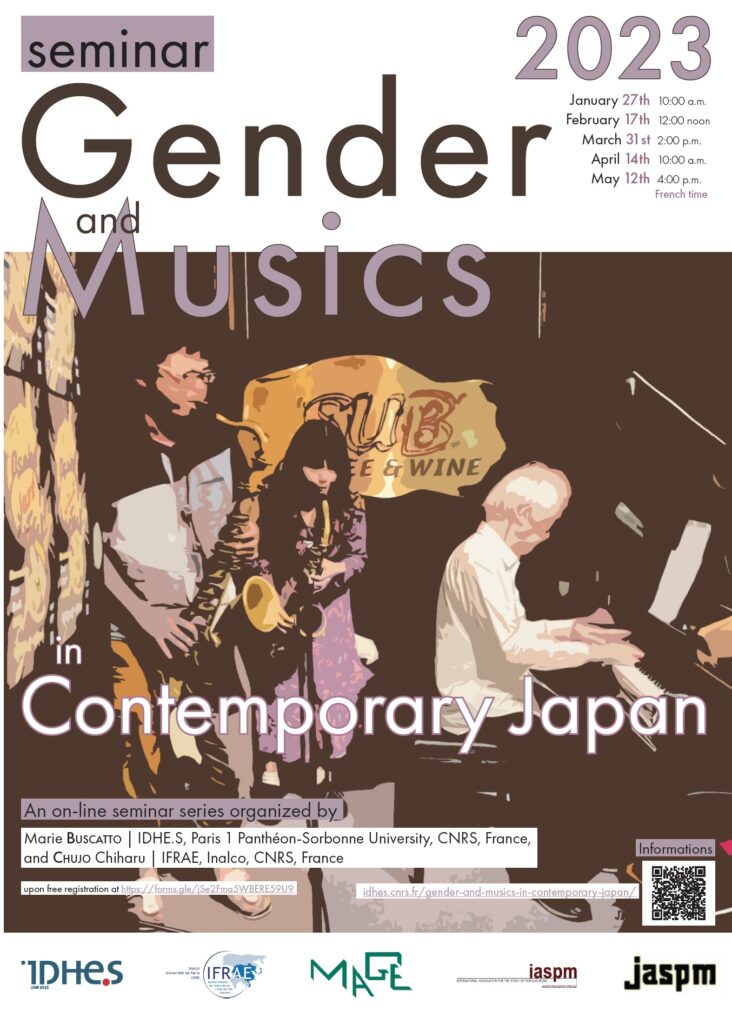La quatrième séance de la série de séminaires Gender and Musics in Contemporary Japan aura lieu en ligne 14 avril 2023 (de 10h00 à 12h30, heure française).
Titre de la séance : « Masculinities and Racisation in Music »
Discutant : Koizumi Kyoko | chercheuse indépendante
- Transnational Black Musical Bodies and the Crisis of Japanese Masculinities from the 1990s to the 2020s, Nagatomi Mari | Kansai University – Osaka, Japan
- Maneuvering Marginalized Masculinity and Japanese Classical Music, Beata M. KoWalCzyK | Adam Mickiewicz University, Poland
Ce séminaire se déroulera en ligne, en anglais, et pourra être suivi sur inscription gratuite à l’adresse https://forms.gle/jSe2Fma5WBERE59U9
Transnational Black Musical Bodies and the Crisis of Japanese Masculinities from the 1990s to the 2020s, Nagatomi Mari | Kansai University – Osaka, Japan
Studies of representations and discourse of blackness around popular music in Japan tend to focus on the period between the immediate postwar to the early 1970s, when, as Wajima Yūsuke have shown, Japanese New Left intellectuals found authentic image of the popular (minshū) in blues, jazz and Black musicians. This paper advances the field by focusing in the 1990s and onward. In this paper, I explore how and why Japanese music writers and musicians constructed certain blackness from the end of bubble economy and Cold War in 1991 to the 2020s.
As a case study, I mainly deal with representations and discourse of blackness through two cases: October 1991 issue of the subculture magazine Studio Voice and the promotional coverage of the singer Hoshino Gen’s album Yellow Dancer. While the both illustrated Blacks as bodies, thus the Japanese Other, each media used Otherized Black bodies to confirm different Japanese masculinities. By reading this transition, I argue that Black (particularly male) bodies constructed through Japanese men’s affection to Black music have played important roles for Japanese men to confirm their own Japanese masculinities and places in changing Japanese society.
Maneuvering Marginalized Masculinity and Japanese Classical Music, Beata M. KoWalCzyK | Adam Mickiewicz University, Poland
Researchers have established that gender inequalities in cultural industries are rampant, yet this scholarship limits insights into how women navigate these inequalities and largely ignores the experience of men. Drawing from interviews with Japanese classical musicians this paper seeks to address this gap by showing how men in Japan attempt to establish their masculinity through classical music profession. In a society where the meanings of masculinity are still inseparable from work, men who build their career in music must confront social marginalization, because musicianship is not socially recognized as a legitimate occupation. To offset marginalization and to reestablish ties to broader masculine ideals, male artists maneuver their status by aligning themselves with gender, class and racially privileged European male musicians; by demonstrating serious engagement in their work, and showcasing skills mastery. I conclude by reflecting on whether and to what extent these tactics serve to uphold or erode the existing status hierarchies and gender privilege.

